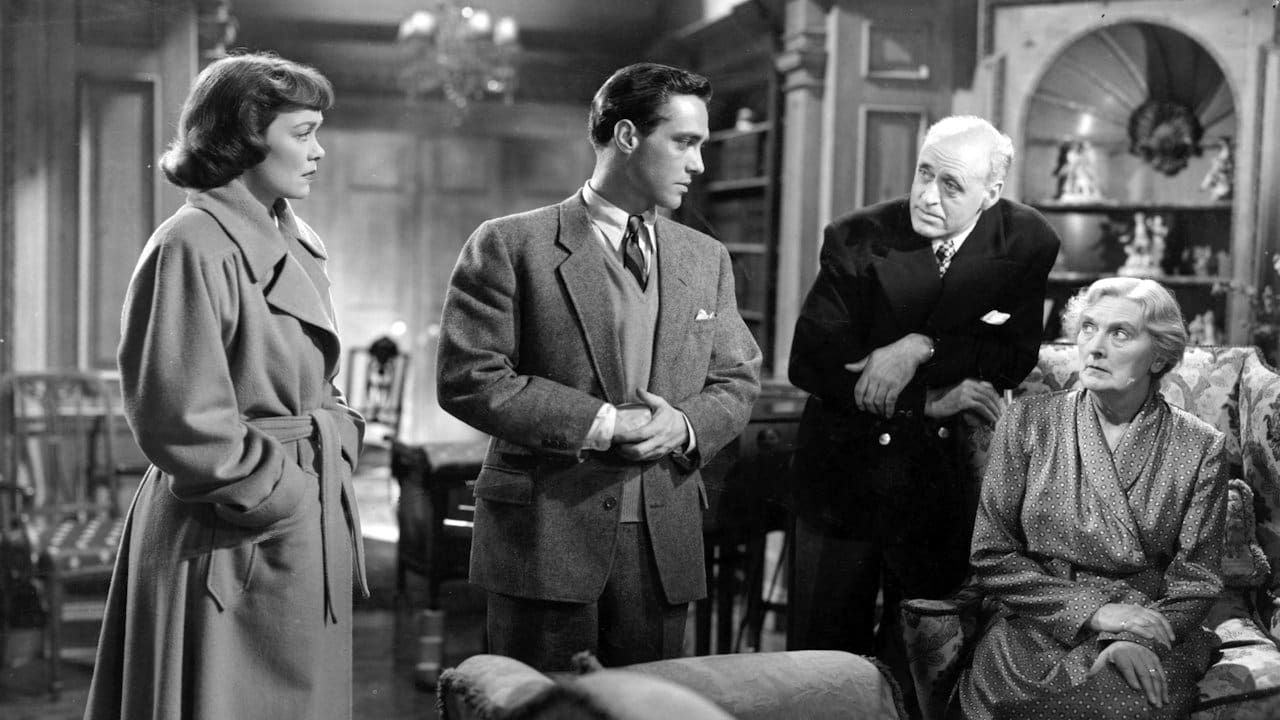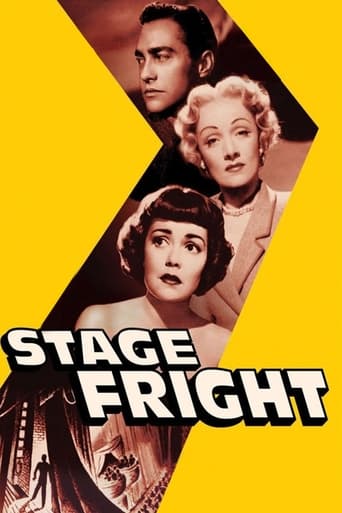Hadrina
The movie's neither hopeful in contrived ways, nor hopeless in different contrived ways. Somehow it manages to be wonderful
Jenna Walter
The film may be flawed, but its message is not.
Yash Wade
Close shines in drama with strong language, adult themes.
Raymond Sierra
The film may be flawed, but its message is not.
charlesem
The first stage of Marlene Dietrich's Hollywood career, when she was under the tutelage of Josef von Sternberg, ended with her being labeled "poison at the box office" by a disgruntled exhibitor in 1938, a label that helped push many of her contemporaries -- Greta Garbo, Norma Shearer, Luise Rainer -- into early retirement. Dietrich was made of sterner stuff, and after a celebrated turn entertaining American troops during World War II, she carved out a second film career by taking on character roles in films by major directors like Billy Wilder in A Foreign Affair (1948) and Witness for the Prosecution (1957), Fritz Lang in Rancho Notorious (1952), Orson Welles in Touch of Evil (1958), and Alfred Hitchcock in Stage Fright. Of these, the Hitchcock film is surprisingly the least memorable. It may be that Dietrich, who had learned everything she could about lighting and camera angles from Sternberg and cinematographers like Lee Garmes, was too much the diva for Hitchcock, who liked to be in control on his sets. But the fact remains that she is probably the most interesting thing about Stage Fright, a somewhat overcomplicated and sometimes scattered mystery in which we pretty much know whodunit from the beginning. Her appearances often come as a welcome relief from the rather tepid romantic triangle involving the characters played by Jane Wyman, Richard Todd, and Michael Wilding. Dietrich sings -- if that's the right word for what she does, being more diseuse than singer -- a few songs, including "La Vie en Rose" and Cole Porter's "The Laziest Gal in Town," and wears some Christian Dior gowns as Charlotte Inwood, the star of a musical revue in London, who bumps off her husband with the help of her lover, Jonathan Cooper (Todd), who is also the lover of a young student at the Royal Academy of Dramatic Art, Eve Gill (Wyman). But Eve also gets caught up in the murder plot when she falls for the detective investigating the case, Wilfred Smith (Wilding). Also providing relief from the romantic plot are Alastair Sim and Sybil Thorndike as Eve's separated and slightly eccentric parents, and some funny cameos by Miles Malleson and Joyce Grenfell. The screenplay is by Whitfield Cook from an adaptation by Alma Reville of a novel by Selwyn Jepson. There are some clever Hitchcockian moments, including a flashback that turns out to be a complete misdirection and some skillful tracking shots by cinematographer Wilkie Cooper. But Wyman, the only American-born member of the cast, feels out of her element, and Wilding turns his character into a moonstruck milksop. (Whatever did Elizabeth Taylor see in him?)
Enrique Sanchez
I could kick myself for ignoring this Hitchcock masterpiece for so long! Considering I have been watching films (not just movies) since I was 10 then I ignored this movie for 49 years. What made me bypass this movie for so many years? The title is catchy and recognizable. I thought it was going to be something else entirely - and perhaps I thought it was going to bad. What fool I was! But thank goodness I recorded it and saw it tonight! One could go a whole lifetime and not discover this because no one talks about it. Why don't people discuss this movie!? There is so much in it to appreciate. Case in point: there is a very clever dolly shot during the first few minutes where walls disappear as a character enters a house from the street, closes the door, and the camera just keeps on rolling as the sound of the street fade away and the character walks in, up the stairs and down a hall.But in it I discovered wonderful Richard Todd and fascinating Michael Wilding, I found a new and higher appreciation for Marlene Dietrich, I added another notch to my highest appraisal of the legendary Alistair Sim, and now I see Jane Wyman in a whole new light. But the biggest thrill, was discovering a new movie by the master of suspense.I won't say much about the plot because whatever I say, is bound to be a lie! (wink-wink) I will let you ponder that statement...I would recommend to anyone who wants to discover the breadth of Hitchcock beyond his half-a-dozen more famous movies.
disinterested_spectator
There is a recurring plot in crime dramas: an innocent man is suspected of committing a murder, and he tries to evade the police long enough to prove his own innocence. Hitchcock often used it, as in "The 39 Steps." This plot requires us to suspend disbelief, because no one has ever proved his innocence in real life by avoiding the police long enough to find out who really did it and getting evidence to prove it. "Stage Fright" is a slight variation on this plot. In this case, the suspect's friend tries to hide him from the police long enough to prove the murder was committed by someone else. Once again, no one in real life has ever managed to do that.In a really good movie, like "The 39 Steps," suspending disbelief is easy, and we are well rewarded for doing so. But in a mediocre film like "Stage Fright," we are only partially engaged in the movie, and thus find ourselves comparing what happens with reality, and being a little put off by the difference. Instead of suspending disbelief, we find ourselves simply disbelieving.Maybe it is just me, but if I were suspected of a crime I did not commit, I would get myself a lawyer and turn myself in to the police. The movie begins with Jonathan telling Eve that Charlotte came over to his apartment with blood on her dress, saying she killed her husband in self-defense during an argument. He says he agreed to help her establish an alibi, and he goes back to her place to get another dress, and while he is there, tries to make it look like a burglary. However, Charlotte's maid shows up, sees him, and is able to identify him to the police. Now, we later find out that this story is a lie. But while I was watching it, taking this story seriously, I thought to myself that I would have simply advised Charlotte to get a lawyer and turn herself in to the police. And if she refused, I would have notified the police anyway.Furthermore, when Jonathan shows up at the theater where Eve, an actress, is in rehearsal, he tells her that the police want him for something he didn't do, and she agrees to help him escape. She should have told Jonathan to get a lawyer and turn himself in to the police. If he refused to do so, she should have notified the police herself.She takes Jonathan to her father's place, where the father agrees to help Eve hide Jonathan. By this time, it will come as no surprise when I say that if I had been Eve's father, I would have told Jonathan to get a lawyer and turn himself in to the police. If Jonathan and Eve refused to go along with this idea, I would have notified the police anyway.Later, we find out that it was Jonathan who killed Charlotte's husband. But that only allows for one more iteration of my general advice. In that case, Charlotte should have gotten a lawyer and gone to the police. Even if she did instigate the murder, as Jonathan claims, she could have denied involvement, and Jonathan would have been the one to go to prison.Now, it might be argued that if any one of these characters had gone to the police, as I say they should have, there would have been no movie. But any movie that is lackluster enough to allow for disbelief, rather than the suspension thereof, is a movie we would have been better off without.
PimpinAinttEasy
Another mysterious, thrilling and violent comedic gem from HITCHCOCK. Here he is supported by a pretty stellar cast lead by the adorable JANE WYMAN. MICHAEL WILDING is really good as the slightly gullible but honest detective.Hitch really takes the audience for a ride with this one. I never thought directors in the 30s, 40s and 50s were this innovative with structure. Films from these three decades really are pleasant surprises. They did some pretty outrageous stuff with regard to structure and narrative back then.(8/10)

